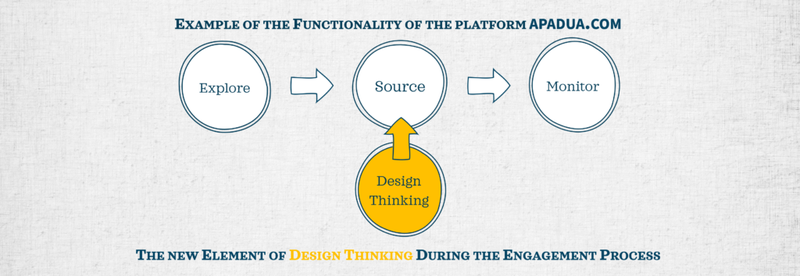
A curious journey: Engagement & design thinking for professional services firms in the age of platforms
The longevity of the traditional playbook for sales and marketing in professional services should be questioned for a number of reasons – one of them being „platforms“. Over the past decade, we have seen various digital platforms or marketplaces emerging. They are not just a temporary trend, but have instead matured over the years and found their way into the buying decision-making, sourcing, contracting, and sometimes even management processes. We highly believe their importance will be boosted by the current #remotex trends forced into most markets by the coronavirus.
Let’s look beyond the current state and discuss how innovative platform solutions leverage the real potential of professional services firms when engaging with their potential clients…
This article is not about the „why“. Instead, we would like to think through the changing professional service definition and go-to-market approaches, which platforms may create for management consulting and other professional services firms (short: PSFs). A few of these firms are publicly singing the platform praise already, others are still skeptical or flat-out against them. After all, platforms do potentially threaten many traditional firms’ strengths (like personal client relationships) and the remaining (albeit shrinking) opacity of the market. Whatever your own position may be, these platforms are clearly establishing new rules for the ecosystem around professional services.
The so-called platform economy has become a buzzword that accompanied disruptive business models like Uber, Netflix, or AirBnB. Most known examples focus on delivering services or products to end-consumers, but they have one common operating kernel: They are all aggregating an entire industry into „one place“ and have forever changed the traditional marketing and sales channels for the affected industries. Furthermore, they have started to become drivers of innovation for these industries as well (e.g. Netflix producing their own movies or AirBnB offering insurance services for travelers).
But what are leading platform examples for professional services?

In traditional B2B industries like management consulting or legal advice, we are yet to witness the emergence of the all-dominating platform as the biggest multi-sided marketplace, which connects buyers and sellers. However, these emerging platform companies like apadua.com, LOD, Upwork, countup, or comatch.com have started early to integrate their niche share of the professional services market. And they have already „made a dent“ in the accessibility of these markets for the buyers – and changed the game for many professionals and their firms.
As with the platform game itself, it is necessary for both new and established firms to accept and experiment with the resulting new ways of promoting and selling professional services in the age of platforms – irrespective of the platform game itself. So let’s think a little beyond mere selling.
Let us create a case study…
To make this tangible, let‘s imagine a consulting firm called „Smart Bots Consulting Inc.“ (purely fictional, really! But we would sell the brand for a reasonable fee if you would like to use the name…). This consulting firm wants to position itself with a brand new offering idea around RPA (robotic process automation) – what a surprise! 😜 They are a young, fairly new firm and need to consider all options to land their clients and build their sales funnel. How can they position themselves with this offering on digital platforms?
After all, they may not even have a first marquee client reference yet and it may be difficult to leverage traditional personal relationships or their recent study on automation (yes, the good old „thought leadership“ approach) on a new digital platform (which is, of course, owned by someone else). Being insecure with how to work the market, let’s says it may be a good idea to start the journey with a „what if“ question involving all key parties in a platform scenario:
What if our imaginary consulting firm would use a suitable platform to approach and better understand their clients? They could even use a collaborative approach to tailor their product to specific market demands and outperform established players by bringing a more innovative approach to the market. A functionality derived from the design thinking concept would perfectly complement the sourcing process, wouldn’t it?

While there may be a few of those „what if“ scenarios out there, this first „quickly brainstormed“ question already provides an interesting design thinking playground for our article: First of all, this simple scenario brings together all relevant players – and puts a strong emphasis on the demand side. It also assumes that the final offering may not be fully shaped just yet (= ready to be put on a platform). It probably still requires finessing for true client fit and consumption as well as delivery readiness. The scenario also assumes that a neutral platform acts as a trusted facilitator and moderator of this demand and supply-side co-creation setting. So, basically the consulting firm, their clients(s), and a marketplace would come together in a virtual design thinking workshop and flesh out the perfect solution and create a bulletproof statement of work – which would then be designed and sold via the marketplace… Doesn’t seem so far fetched after all, does it?
We believe that a scenario like the one described above will happen much more frequently in the near future because all involved parties will greatly benefit:
What’s in for the consulting firm?
At the same time our supply side, the firm Smart Bots Consulting Inc., knows that it gets help to come up with an offering, which really sells in the end. They also get connected with clients – possibly new clients, which would have been hard to acquire otherwise (because of a lack of trust, which is now provided via the platform). Of course, the firm’s cost of sales is also likely to stay much lower than in a traditional purely people- and a relationship-based approach. Furthermore, the firm may be interested in leveraging the platform to scale not only the sales of its solution but also their delivery as much as possible – so the envisioned solution is likely to be a lot more digital. Only a digital solution can be both sold AND delivered via an online platform.
A fair cut for potential clients…
With the developed insights, Smart Bots Consulting Inc. will be able to better align with their clients, sharpen the service levels or statements of work, deliver quality, great client experiences and high adoption/usage of its solutions by the client and thus eventually increase client satisfaction which pays off in the long run. So, this setting is not only likely to create a great offering, but also one that is based upon a much more digital and thus scalable business model…

Conclusion
This brief „what if“-scenario can be used to argue that aggregators of complex professional service industries should probably aim to be more than mere sales channels or marketing platforms. They need to incorporate a collaborative approach helping industry clients to shape up their project demands, give professional service providers the chance to contribute to the demand and solution specification process, and open the space for a more transparent request for proposal processes and even enable digital delivery.
But what happened with our imaginary firm Smart Bots Consulting? Well, they probably went through this design thinking exercise – and, for example, designed an innovative solution together with their client. They have leveraged the platform as a facilitator and (ex-ante) trust and reputation layer – and not only won a new client but also finetuned the design of their solution. The resulting offering is now marketed via the platform and much more likely to gain good traction with new clients (ex-post visibility). Nonetheless, the firm is also keenly aware of its growing platform dependence… and probably needs to keep an eye on the reach of their chosen platform partner and potential alternatives.
A few closing words: The described scenario is anything but fiction. We see the immense necessity to maximize interaction between service providers and their clients, as demand is usually poorly described and understood, and solutions are thought through too late in the cooperation process. So, please let us know what you think about it and which other perspectives should be examined in future articles about this emerging topic – like the client perspective, the platform provider‘s position, or even a regulatory angle…
Being in close contact with our clients, we at APADUA are convinced that this example marks the next level of engagement management with benefits for all participants in a further growing platform economy for professional services.
What’s your experience with design thinking during the engagement process?
[A special thanks to the article’s co-author: Sebastian Hartmann | KPMG]
Author

Companies' demands are shifting their importance. Strategically, Professional Services has become a category as important as New Product Development or Materials Procurement. With apadua, we are the needs of our corporate clients by shifting the balance from a sellers' market to a buyers' market. Our clients have a long-standing track record using our software. Our technology leverages AI to become the gold standard for Professional Services Procurement.
Latest News
Interested in learning more?
Request a demo and in just 15 minutes we can tell you how Apadua can help your company become better in procurement.

